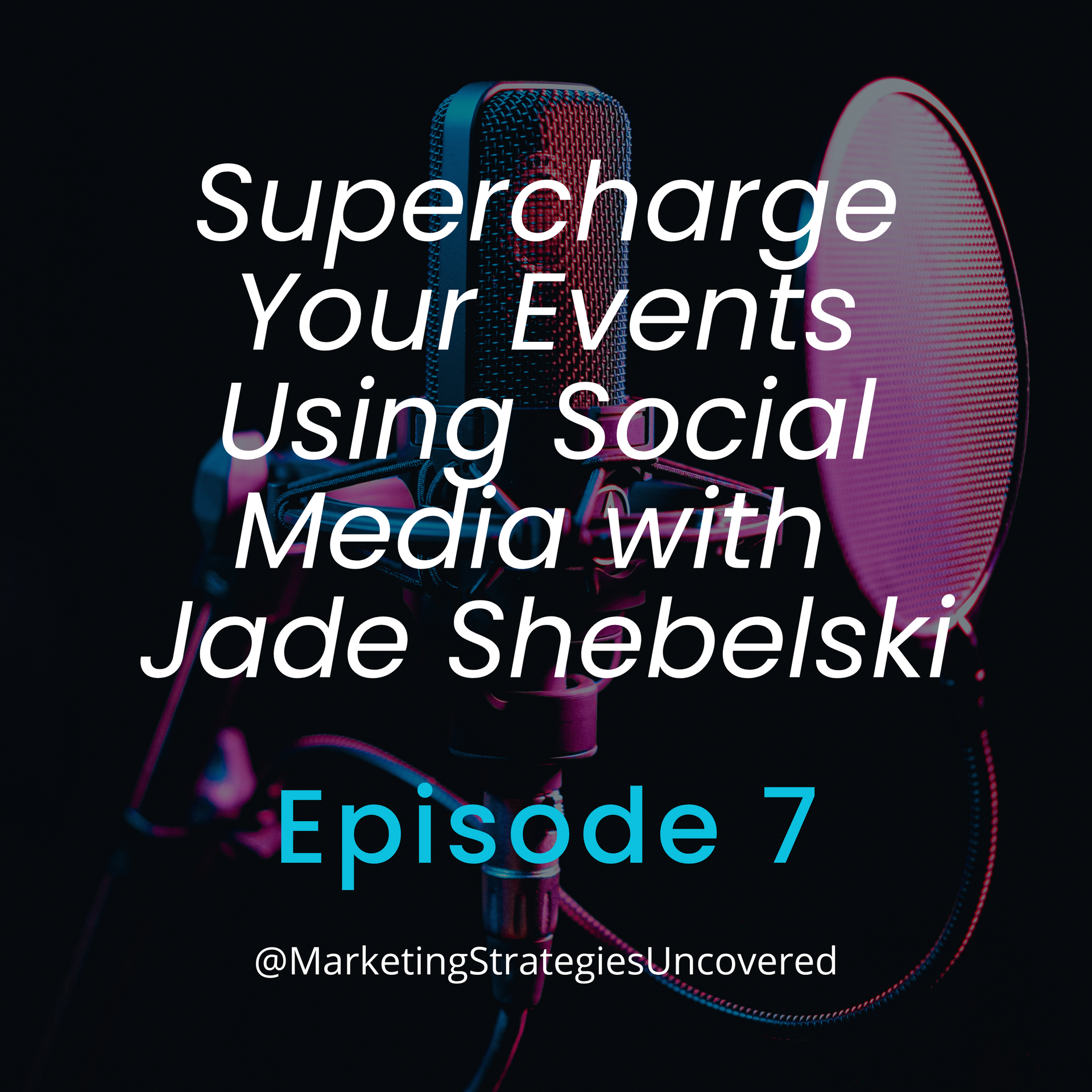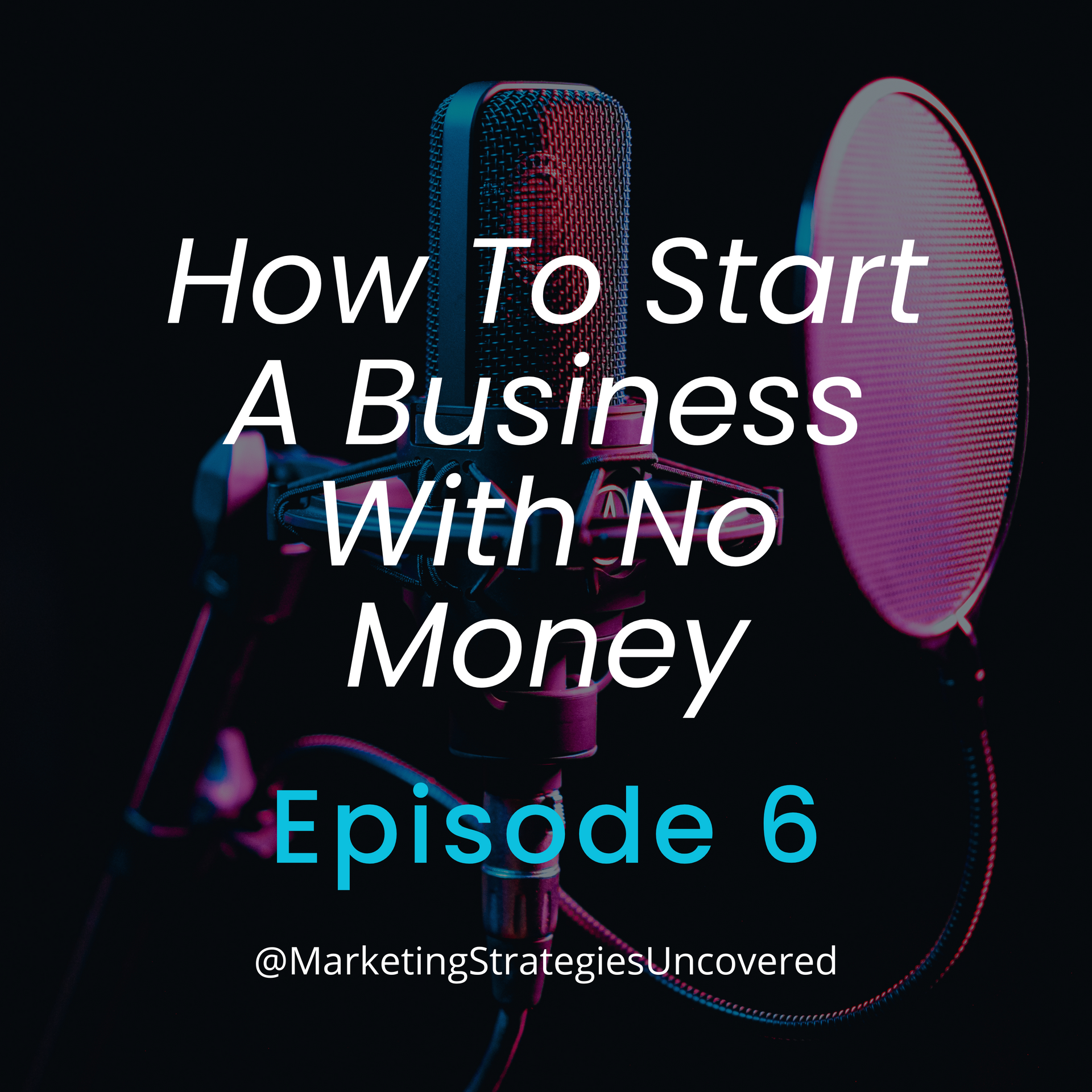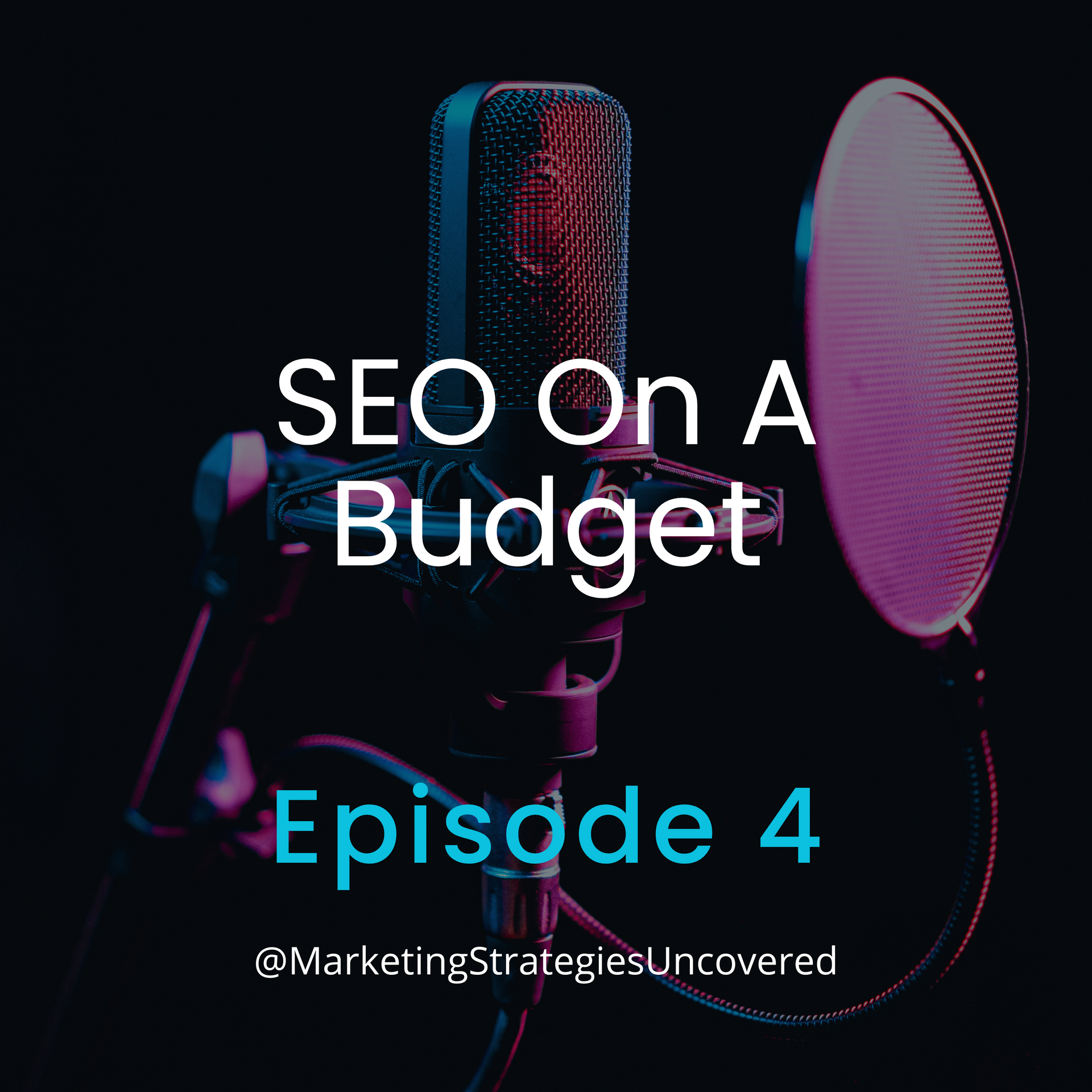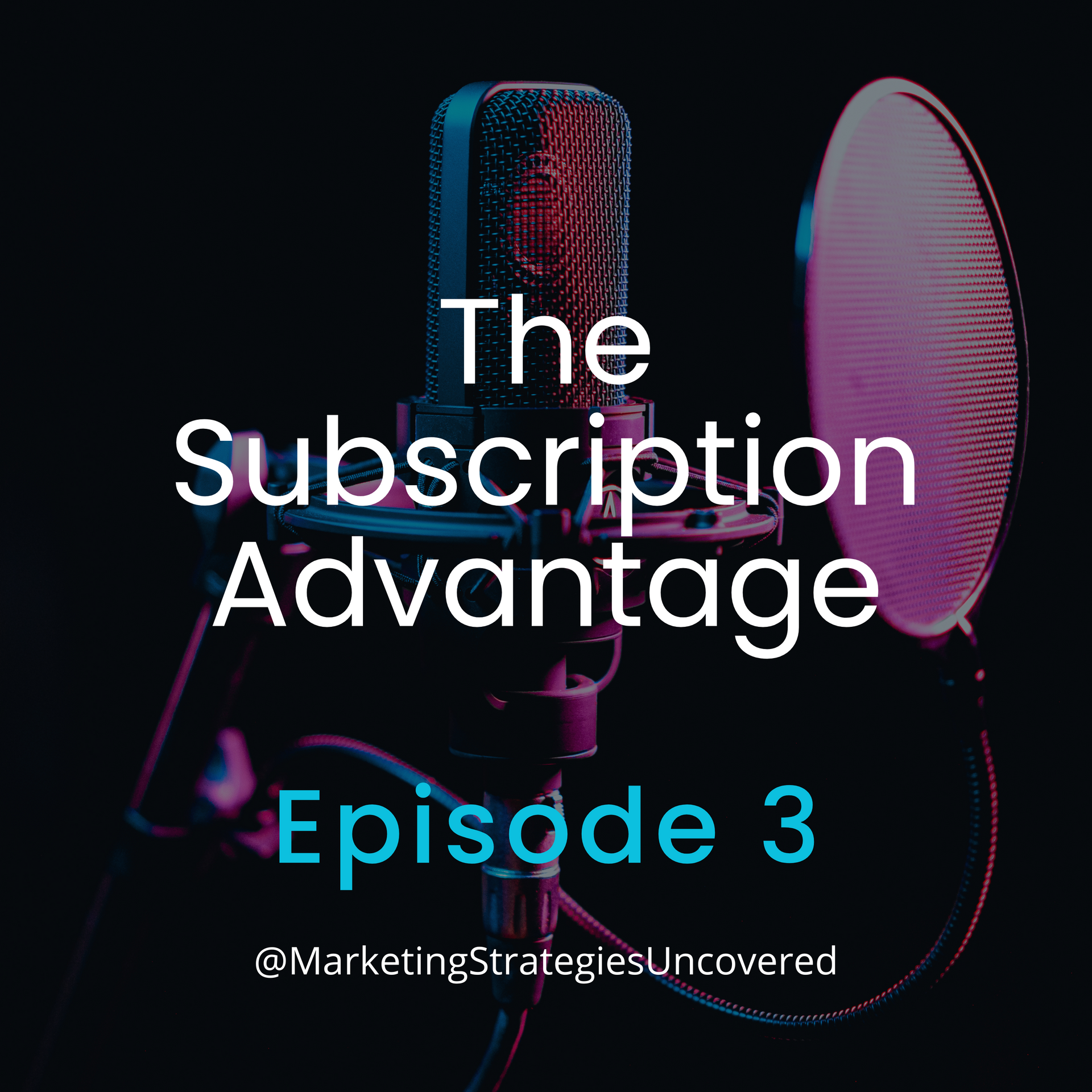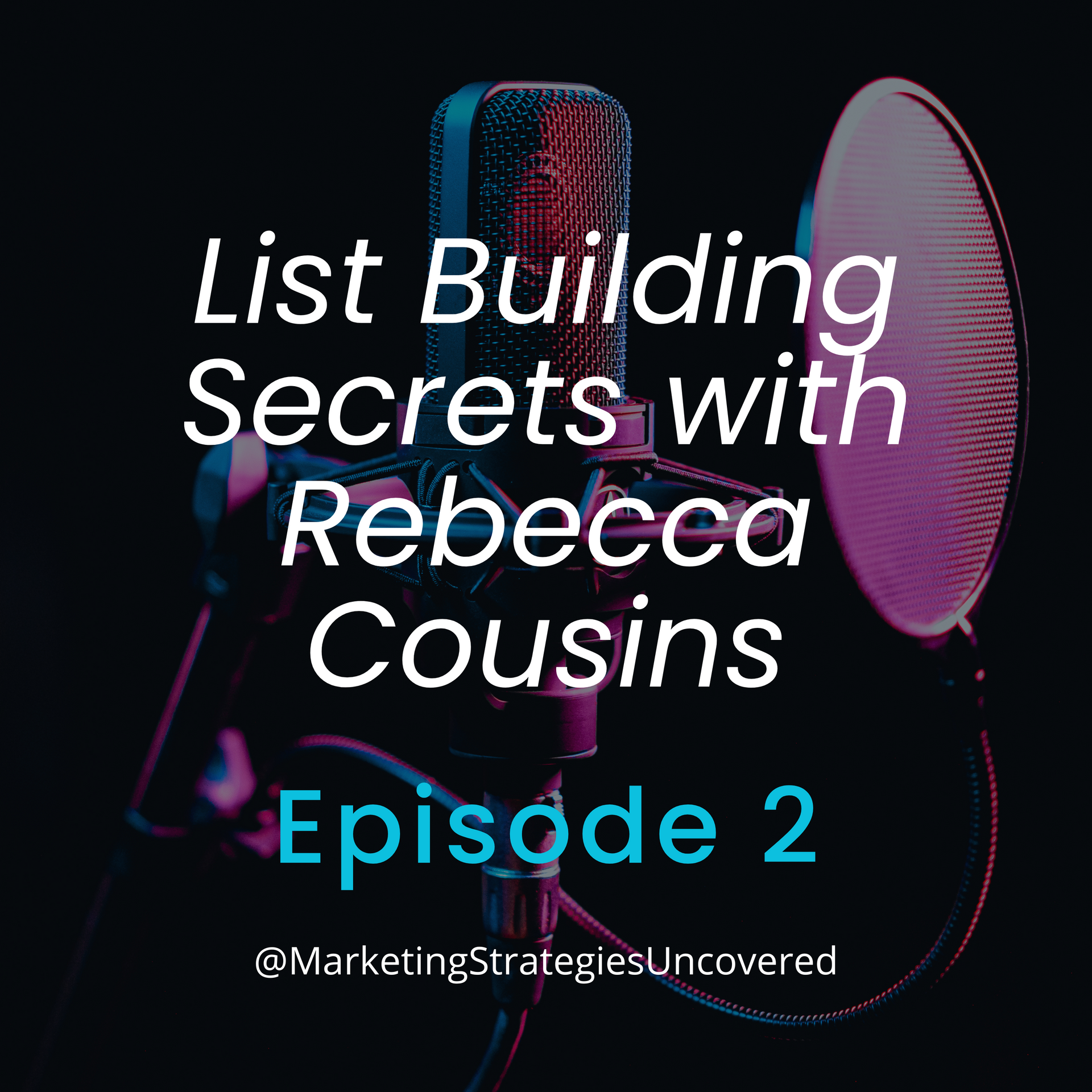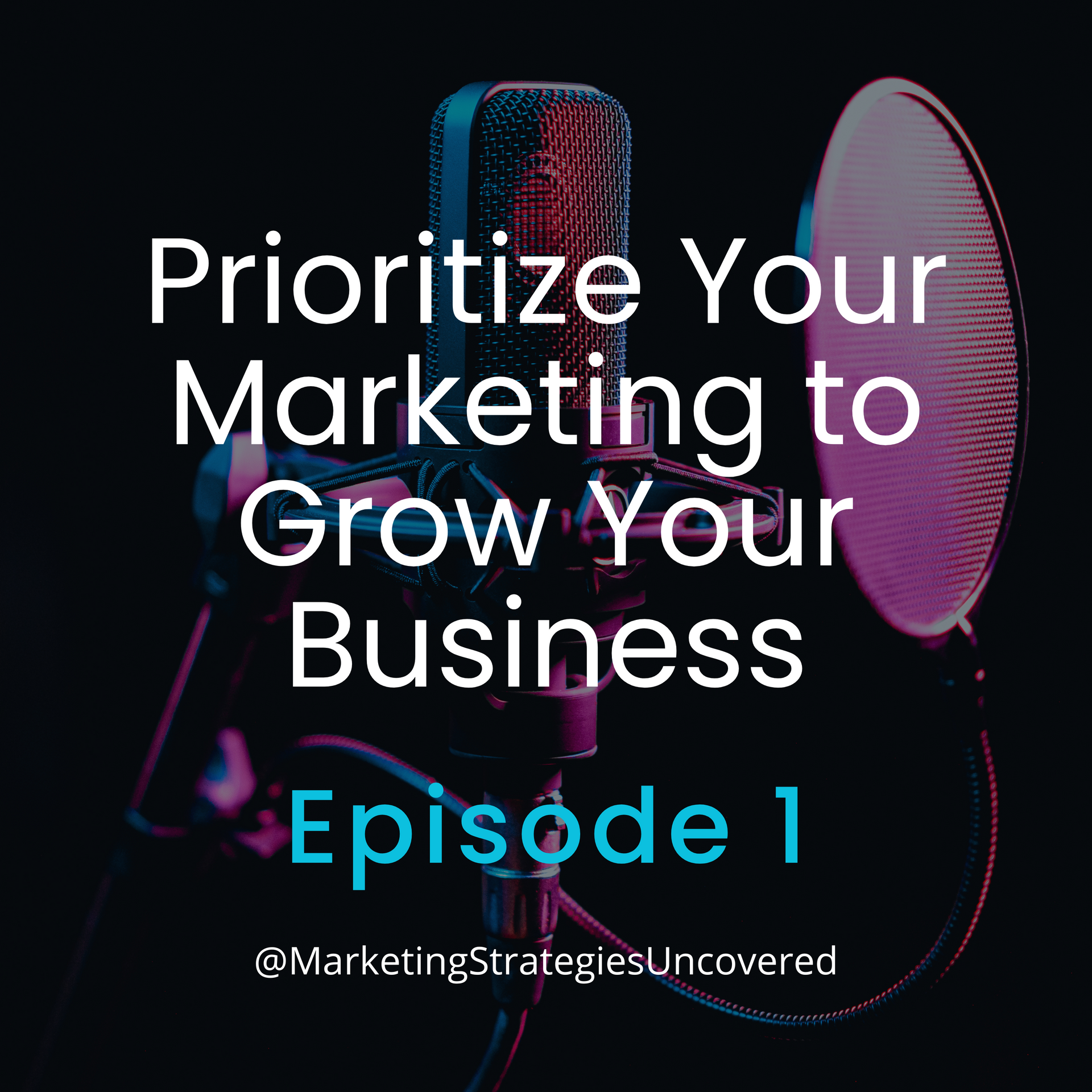Full Transcription:
Rebecca:
Hello everybody and welcome to another episode of marketing strategies uncovered, I am your host Rebecca Van Diest a nd today we have a really special guest joining us.
Joaquín, can you introduce yourself?
Joaquín:
Yeah, my name is Joaquin Herrera, and I run a video production company, handling pre production, production, and post production with video.
Rebecca:
Nice. What's the name of your business?
Joaquín:
Blazing Heart Productions, and you can find my Facebook page that's dedicated to blazing heart productions.com.
I will build a site, I just haven't done it yet.
Rebecca:
Yeah, it's all part of marketing and I just gotta do one thing at a time. It is really cool though that you can point your URL to your Facebook page and use that like as a temporary place so people can find you. That's a really smart thing.
What inspired you to get started doing what you're doing?
Joaquín:
I would say that I began as a visual artist, before and underneath everything else I do. The mid 90s, I worked at a video rental store back, you know, in the VHS days, right.
There were a couple floor model cameras and one took the full size VHS tape. And I was allowed to take it home because it wasn't brand new. And I would create short films. but this was before non linear editing.
So What you would have to do is shoot everything in camera, which means in sequence, which means if you have a person having a flashback, you'd have to shoot the first part there in the room and then set up the other location for the flashback and then come back and shoot when they come back.
So it's like that is very arduous, but I really loved doing that. And I would even make little short films out of like actual. like stuff we had to do, right? So it was kind of playing with documentary and playing with fiction short films. So that's kind of, how it started. And eventually I went to school for photography and then I left school and I went to do labor for 10 years because of my life and everything.
And then I came back and I went to NYU film and that's kind of where I finally came to this. So
Rebecca:
Well, it sounds like you really had a passion for it to be doing it for a long time because we're talking about VHS, which some people might not even know what that is.
Um, but yeah, that you were so inspired to do what you did that a lot of people wouldn't think to do anything like that. So that's, that's pretty cool. And then you were telling me also, you also have a martial arts business, and you're saying that kind of plays together. Can you explain that a bit?
Joaquín:
I would say that video, film art, and martial arts are probably my two great passions that have endured for many years. when you have passions, real passions, sometimes you can synthesize, you can find ways to join them together. You can sometimes find a brand new product operation style approach. I do promotional work for the martial arts school I train in currently, and I also do it for a past school I've trained in.
I'm also a coach and I film work and I reflect on it and I learn watching it. So everything kind of blends together. And whenever there's an opportunity for creativity to come out of that, or even a creative product that I can bring into my business, It just kind of springs out of that.
So there's a lot of flow and creativity happening between the two. Absolutely.
Rebecca:
Nice. Love it.
Why do you believe that video is such a powerful tool for marketing and social media?
Joaquín:
I think video is very powerful. Sometimes it can be misused and it cannot be powerful at all. It can be noise.
I think when it is powerful, it's because it's integrating multiple forms of media, right? We're reaching people with sound, which is extremely powerful. And I could go off on a sidebar here for a long time, but audio is actually more powerful than visual. You're reaching them with audio and video, and text and QR codes nowadays.
So you can take them right to a product directly. there's lots of times in a commercial or an ad we're watching. Sometimes they fall flat. Sometimes they're terrible and unimaginative and insulting, but sometimes there's a really good one or it just appeals to something we need. And there's always that moment where you're like, Oh yeah, I want that.
And if you have a QR code, boom, you're right there. You're buying it done. So it's very powerful in many ways. But again, I think there's, unfortunately, a glut of unimaginative, lazy video advertising and promotion out there and it just becomes noise and we are very good at tuning out noise as people who grow up in a culture where we're inundated with advertising.
So I think you have to be thoughtful, careful, and artistic. And I feel like one of the things that really pushes my work ahead of other people's in this area is I began in fiction filmmaking. I had no, Desire for the marketing, honestly, or the commercial parts of it at all. You know, I'm a storyteller.
I'm an artist. I get into the stories, and the communicating of other realms and feelings. But if you can bring a strong storytelling background, being educated at NYU films, one of the best film schools in the world, plus the work I've done out in the field since then. And you just, Hit a little 15 second or 30 second commercial with that kind of background, then you can make really impressive work, especially if, again, you're trying to avoid being lazy and repeating stuff that's done all the time that people tune out.
Rebecca:
That's a good point. Yeah, because anybody, especially now with cell phones, we can all make video like doesn't mean it's good. And it takes a lot of practice to actually be good at it. And I love what you're saying with the storytelling, having a back message and Yeah, that that can be definitely a lot more powerful than just posting content just to post content because it's probably going to hurt you more than it helps you.
Would you agree with that?
Joaquín:
I would say that you almost never get a second chance with a new contact, a new customer, potential client, someone watching your stuff. Once we decide, eh, you know, Then you're not going back. But if a product comes out and you're like, Whoa, that was a match. That was creative.
Sometimes I don't even particularly like an ad, but I so much respect that the concept or something they did with it. That I'll be like, okay. You know, now I'm going to pay attention.
Rebecca:
For sure. Sometimes just Facebook ads too. I'm like that. I don't necessarily care what it's about, but if they do a really good video or a really good ad, like you can at least respect it, even if you don't want to work with them.
Joaquín:
Right. And I think that touches on something so important for people doing promotion and video is that you should never talk down to people. A promoter, a videographer, a marketer, they might think that if I talk down, then I'm going to reach a bigger range of people.
But what's going to happen is, you're going to insult a lot of people, and they're going to feel irritated. So people don't like that.
And I think that's a huge mistake. And I'd much rather aim for what feels like a narrower target market. With a message that's aimed intelligently and just resonating, with language or an energetic approach.
Rebecca:
Yeah, kind of like having the awareness that talking to people just like a human being and also in a way that they can understand it like for me, I do SEO, and a lot of people don't understand the terminology that I use.
And so I have to kind of be creative in the way that I say it. I don't think I'm talking down to people, just talking to them in a way that they understand what I'm saying and just being relatable.
Joaquín:
Mm hmm. Well, that's, that's almost a separate thing, but also very smart. And that is that you have to shape your message to the ears, metaphorical ears.
That your target market has. That's separate to me than talking down to someone that's simply being about your message, but I hope it's clear what I was saying. It adds a lot of noise to the communication highway and it's just not my style. i'd rather be seen by perhaps fewer people, but make an impact they see and say wow This is a cool company. That's a cool ad It's going to pay off much better because they're going to tell other people, you can't think short term
Rebecca:
That makes a lot of sense.
Is there any trends that you're noticing in video marketing that people should start taking advantage of or doing more of?
Joaquín:
I think they're pretty apparent or you're watching. One of them is accessibility, right? Everyone's using captions now. This is, was interesting to me. I have my daughter and we'll watch a movie together and she's 17 and she'll be like, Oh, can you put the captions?
I'm so, I'd never put captions on unless it's a foreign movie. You know, that's it. I love a lot of foreign movies and I want to know what they're saying. But other than that, Nah, you just make it out. If you miss it, you miss it or you go backward.
That's a new thing. Everything's getting shorter and shorter.
I don't know if it's human beings or if it's how we're being marketed to, but apparently the zeitgeist imagines human beings as having a very, very small attention span. And maybe that's true. Maybe it's partly how we're trained and partly how we just are moving as a culture, but yeah, 30 seconds, 15 seconds. More people are watching 30 seconds than a full minute.
You got to be smart. There are always ways to break those rules. You can get people to watch a minute, but your first 10 seconds better be interesting. And they better be different than what other people are doing. So it's kind of like that. It's almost like a, if you were kind of coaxing along an animal in the woods with crumbs or something, right, you know, you got to catch them right away, you know, and respect them.
To me, that's one of the biggest rules. You have to respect your audience.
Rebecca:
Yeah. Grabbing people right away. And yeah, especially after Tik TOK started becoming a thing, they're having the even shorter videos.
Joaquín:
And you know, that's a whole art, you know, and I went through a phase where I would do a minute long advertisement.
I started offering packages to clients for like, you can get a minute, 30 seconds, 15 seconds. I can flashback to the way distant past with the Burma shave advertising, which changed everything. They would have a sign on the highway, and you'd be driving and you'd see one word, right? You'd be like, Huh, that's weird. And then a mile later, another sign, another word, right? All part of the same campaign. This changed advertising. That influenced me a little bit where I would offer them things and say, listen, here's my idea. Drop a five second ad. You think it's impossible, but it's not. These are like a little, when a movie's brand new, whoosh, whoosh, you know, back to black, you know, and it's five seconds. You're like, what was that? Maybe it's just a logo, like the Batman logo looking all rusty or something, right? Five seconds.
You're like, whoa. And then 10 seconds, like a week later, the 10 second version. And then a week later, you got the 15 and then they dropped the full ad, you know, and this gets people increasingly excited and interested. So that's why I think of the Burma shave campaign. This is something I would like to do. It's an option. Clients can just go for the minute long or whatever, but what I've found with clients and, they can choose, they can pick and they can just go whatever they want, you know, people like options.
We all want to save money with everything we do. There's no judgment for me on that. But. I do sometimes have to remind clients that video works in a way where if you try to budget too much upfront, you're going to get almost no effect from the investment.
And you shouldn't do that. Really the smartest way is find out what it takes, find out what you want to do. I mean, really engage pre production with your video maker, get in there and ask your questions, talk about what your goal is. If they know what they're doing, they're going to be able to shape What they do for you to your goals.
You own that video. Now you can use it a hundred times in a year. If you break down the ROI on your usage, it's absolutely worth it. And if you get a package like that, where you're like five seconds, 10 seconds, 15, 30, you know, and then you can do like an old style, big production house movie or Burma shave or whatever, and really create a buzz.
That's important to create a buzz.
Rebecca:
yeah, like actually invest in high quality video. It's definitely worth it. The cool thing with video, like a YouTube video versus a Facebook post, the YouTube video is going to last so much longer and work so much better for you.
And the higher quality, again, it's gonna just do so much better. So I definitely agree with that.
Joaquín:
Yes, but I have had experience with very positive results from Facebook campaigns as well. And in my experience, you don't even need to lay out a ton of money with them, but people have to see stuff over and over.
We're all like that. Even if it's a good ad, we're going to let it go by the first three or four times. And eventually we're going to say, all right, this thing keeps popping up. Let me listen. So you do have to create a lot of ads on Facebook.
Rebecca:
Nice. How do you develop a video marketing strategy for a new client?
Joaquín:
Yeah, this begins with the purpose and the theme. Their brand colors, their brand fonts, you know, it all starts there.
What the feel of the company is, because that's going to affect the style and approach of the ad. So these things have to be in sync, right? That's the most important thing. The customer and the client and the company and their goal is the soil.
And the campaign, the advertising is going to grow out of that. It's going to draw from it like a plant, like nutrients, it's all going to flower from that soil and every intention and desire and style of that company is going to bear fruit and manifest as that, that's how it should be. That's how the ad should be an extension of everything that company is. If the company is understated and the style is classy, but not cocky. That's how the ad has to be.
One of the biggest lessons in film school was, what does that look like?
Right? Oh, my character, he's having this crisis. He doesn't know anymore if he's this or that. Great. What does that look like? Right. We were not inside their head. This is a visual medium. This is filmmaking. What does it look like on the screen? Okay. On the screen, it looks like a guy looking in the mirror, checking white hair, you know, whatever.
Right. So this is how we learn to do it. It's the biggest lesson. You cannot become a filmmaker until you understand and can operate on this principle. So taking that over to what we're talking about, advertising campaigns, you're manifesting something visual from a perhaps not visible intention, promise, product, and so. What does that look like? You know, and it's a visual manifestation of something that's not necessarily visual.
Rebecca:
I liked how you're talking, about the branding And how important that is. I think people don't necessarily realize that you want everything to feel the same, that it all makes sense that if your video looks a certain way and then you go to somebody's website and it's completely different, you're not going to feel like that's the same company at all.
So I love that you're tying that all together and taking each client individually to make it fit them and their business.
Joaquín:
Very important. Yeah.
Rebecca:
What do you use to measure results?
Joaquín:
I measure results generally by one thing. It's not very geeky. It's feedback from the client. That's it. I can't make people sign up. But if it has increased interest and brought more clients and if it's increased the interest and their sales or membership, I've been successful. That's pretty much it. If it hasn't, then I need to come back with them and talk about all of it., , and there's going to be answers in there with, with a conversation and there can be adjustments. But that doesn't usually happen.
You know, I'm not perfect. My work's not perfect, but I usually don't leave a job alone until people are thrilled. I've had a couple outliers. Sometimes you run into people that are hard to make happy. Aside from that, I would say I usually leave people thrilled.
That's very important to me.
Rebecca:
Awesome.
I know some people get really, really nervous when they're being recorded. Do you have any tricks on how to get them to be more comfortable?
Joaquín:
Oh, I sure do. That is such a big part of interviewing. I've developed and felt that out for many years. Another kind of, well, jokingly unfair advantage that I have is that, my first interest in a career, I started with counseling. So I have practiced listening to people. And I'm trained to listen, actively listen. I'm very good at listening. A lot of people don't understand what an art it is, and they'll do little things, little micro behaviors that just shut down the conversation.
They'll look over your shoulder, they'll look at their watch and a sensitive person knows when you're not hearing them. So I am very good at interviewing people and I do have tricks. Let me just pick one or two. Okay. For example, I start with checking the sound levels and getting the frame line and stuff, even if I already have the frame line set up.
So this gives you a lot of opportunities to have a little chit chat with them, right? You can bring them into a comfort level just in the first 15 minutes. And this is not unique to me. I'm sure these are tricks of the trade that a lot of people do, but I'll just be like, so, you know, you live around here and they'll say, oh yeah, how'd you get here?
I'll just get them talking. And there's a post like this up on my Facebook film page, where I show a little reel where I'm doing this. I'm talking to them, getting answers I'm listening, but really I'm watching the sound levels as they talk, and in the beginning, when I did this, I just thought, Oh, how clever I am getting the sound levels as I just pretend it's a conversation.
I realized that it's good for other reasons, because They start to relax. When I watched back and I watched them, I realized that it was serving a purpose of gradually them relaxing.
And usually also in the beginning, I'll say, okay, your answers don't have to be perfect. They don't have to be neat. You can leave pauses. You can clear your throat. You can start over. I'm a good editor. I will cut all that out and you will come across as fluent.
That will bring down the temperature a little bit more too. And so I have numerous things I do that just keep bringing the temperature down.
Another one is when I'm putting the mic on them, I'm very respectful of people's bodies.
I'm a martial artist and I'm a father and I was a counselor. There's lots of reasons that I understand personal space and autonomy and dignity. It's all very important. It sends a message. When I put a mic on someone, I will not be putting breath on them. I will not be looking at their body, you know, just lots of little things like that. I will let them do certain parts. So I don't have to get too close to them. And all of this also communicates something to them. And then they feel they trust you. You know, this guy cares about me. He's being respectful.
By the time I get to the actual interview, they're warmed up. They're relaxed. And also, I don't count the first 10 minutes of any interview because, about usually five, but I say 10 minutes, they're going to start talking louder than they were when you did the sound check because they're more relaxed. Their voice starts going up and maybe they're going to start to get a little more real, you know?
Rebecca:
Yeah, realizing, you're a safe space, basically.
Joaquín:
They can open up, they can just talk. There's nothing to be afraid of.
Yeah, your number one goal is to get them to trust you in a short amount of time.
Rebecca:
Is there technology that you really recommend for getting good quality video?
Joaquín:
What people need to know, sound is the most important thing.
It's been factual, we'll show you, it's backed it up time and time again, that people will actually watch a video that has good sound with artifacts or problems with the visuals. They will not do the opposite. You could have clear visuals, but if the sound is crap, they will move on. Also sound works and gets into our body subconsciously.
If you're aware of that as a filmmaker or a videographer, a video editor, you can bring in sound in places that people aren't expecting it.
Have a second shotgun mic pointed at the people because something's going to happen sooner or later and you're going to lose your sound and you're going to be so happy or so angry that you did or you didn't have a backup for that. So I'd say always back up your sound.
Always be aware with older people, especially older women. You want to use really soft light and have it be well rounded. We all have angles and lighting. I can make anyone look terrible and I can make anyone look great. And that is a skill I've developed as a cinematographer. So you want to make your people look as good as you possibly can.
Rebecca:
Do you have a camera you really like?
Joaquín:
Yeah, my favorite camera currently is the Black Magic camera. It's a great company out of Australia. And I really love this company for their approach, who they're catering to, what they believe about who should have access to their products, what they charge, what they give away.
I've had lots of video cameras. This is a different beast. It's captures at more depth, more data, more information. We watch stuff through this camera. It looks like a film, right? It looks like a movie. It's like really, really deep, big fat video codec. This stuff might not make sense to people, but it just captures a lot of data and looks really nice.
I also have get a lot of use out of my, 360 degree camera and that's a great addition to, that's a piece of technology that can do a whole lot. It can look like it can make shots, look like a drone shot when it's just on a stick, it can film. And then you can choose the framing later because it's 360 degrees. So you can move the view to anywhere. You don't have to choose the framing, like you set up a camera. It's filming everything. And when you do post production, you decide what you show and how close.
And so it's really wild. So I would say those two things. Videography is kind of like a candy store for people who like tech. So you could go on and on and on. There's lots of technology to help you do what you do. I think more important is. Finding what you need to do on the set for your particular approach and job position like that's going to depend that's going to shape your technology package that's going to shape your gear pack.
Rebecca:
Yeah I agree, it's like a candy store. Technology these days. There's so many options and so many price ranges.
Joaquín:
A lot of fun.
Rebecca:
What do you see like the future of video marketing? Do you think that it's going to be changing in the next five years or so?
Joaquín:
This might just be a hope. I really feel like we need to move beyond the old model of just inundating people. Like I've kind of referenced here, there's kind of a lazy model in place that does work to an extent. Flood the channel, just show the same commercial a hundred times a day.
I feel like that's so blunt and primitive and manipulative. I just don't like it. I think it's heavy handed. I don't think it's good for people and we can just be more intelligent and creative with our marketing.
As technology changes, it'll move into three dimensional stuff. I'm sure in video games, there'll be three dimensional QR codes, like, as part of the scenery of the city, a little thing on top of a building spinning around, it's absolutely going to change as visual technology changes.
I don't want to say anything definitive because this is kind of something more recent I've been exploring and realizing.
It seems like the newer generations kind of feel like there's more authenticity if stuff is kind of just filmed as is, you know, whereas where I came out of film school, art directors for the set, right? It's all completely produced and controlled, and a lot of us love that, but I'm starting to, see that in some cases it's the opposite.
Rebecca:
Interesting. Yeah. I think people want real. So even though AI is kind of taking over in certain ways, we're noticing right now with social media, for example, I started running Facebook ads and I was taught not to use a like professional headshot.
I actually use a selfie photo that like just looked really real and me really happy and genuine and that one's doing really well. So it's kind of interesting because it's more eye catching versus just what looks like maybe a stock photo.
Joaquín:
And we again, we are used to tuning stuff out like that.
Like if you see some really professional headshot, you might even say oh it looks gorgeous, but you're not thinking about it after that Right. But if they're just in the kitchen or their hands up cookie batter, whatever they're laughing, you're going to feel that it's going to be more meaningful.
Rebecca:
Where are you located and where do you serve clients.
Joaquín:
Yeah, I'm located in Portland, Oregon, and, that's pretty much the location I serve clients and there's there's outlying little areas that are not necessarily called Portland.
It's going to depend on the project. I even have a couple clients. I go to Eugene for. Those are bigger projects that pay more and make it worth taking a multiple two hour trips, but in general for most budgets and most projects, it's right here in the city.
Rebecca:
All right. Well, thank you so much, Joaquin, for coming on the show. I think there was a lot of valuable content people can take away as far as Hiring a videographer, what they can do on their own, and just the trends that are happening, which is really awesome.
Joaquín:
And if anyone has questions They don't even have to like hire me or nothing like that Feel free to drop by the website leave a message or my instagram is blazing heart productions. Yeah, send a message ask anything. I'm happy to share my experience with people, I'm happy to help.
Rebecca:
Awesome. So Instagram is the best place to reach you?
Joaquín:
Instagram and Facebook are the best places. Yeah.
Rebecca:
Awesome. Well, thank you so much for being here.
Joaquín:
Thank you, Becca. Bye, bye.
